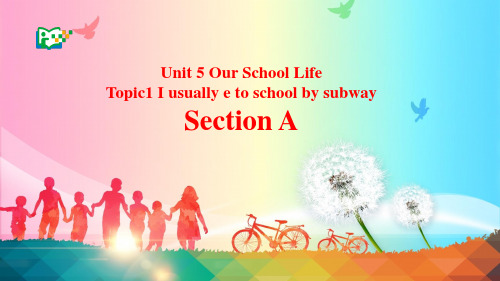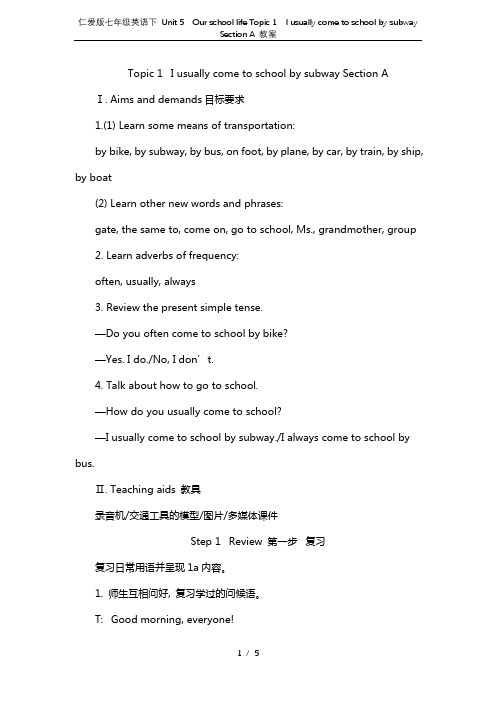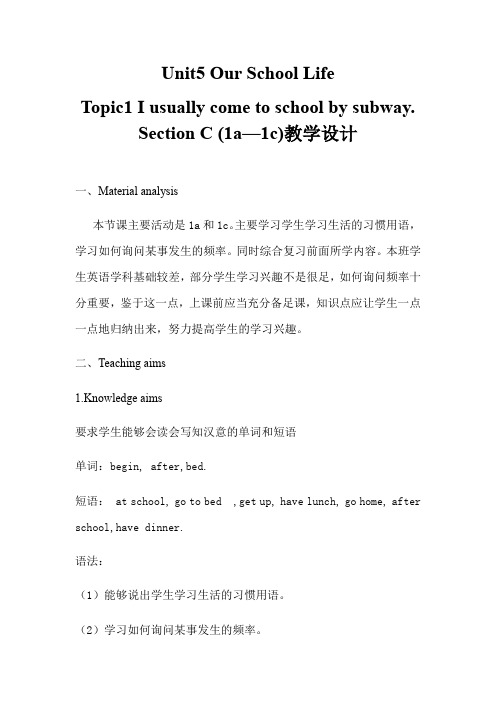七年级英语下册Unit5OurSchoolLifeTopic1IusuallycometoschoolbysubwaySectionB课件(新版)仁爱版
仁爱版七年英语下册Unit 5 Our school life Topic 1 I usually

Then choose the right picture.Iຫໍສະໝຸດ G AD H EF
B C
3.一问一答
A: How do you usually come to school? B: I usually come to school_b_y_s_u_b_w__a.y .
A:How does he get to school? B:He often goes to school by bike
(一)复习导入
Good morning, Miss... Nice to see you, too! Happy New Year! I usually come to school
by bike.
_____________________
Good morning, Li Lei!
Nice to see you again! The same to you. How do you usually come to school?
2.教材的内容:让学生学会怎么表达交通工具和乘坐交 通工具;频度副词often, usually,always的使用。
3.教学重点:交通工具的表达和准确运用搭乘何种交通 工具的表达语句.
教学难点:乘坐各种交通工具的表达方式。
4.疑点:本课我们要学习介词by表示“用,靠;通过, 借助于(方式、手段)”时的用法。如:by car。用来表 示交通方式的介词还有in和on。如:in a car。此时交 通工具前要加限定词。但on foot意为“步行;走”。 foot前不需任何限定词,foot也不能用复数。
七年级英语下册 Unit 5 Our school life Topic 1 I usually c

Unit 5 Our School LifeTopic 1 I usually come to school by subway.Section A一、教学目标1.能根据已学语音、音标及发音规则,正确朗读下列词汇并在实际的对话操练中加以应用:gate, by, subway, underground, always, come on, on foot等;2.学生在小组合作活动中,能掌握字母e和d以及字母组合ea, ee, ei, dge的发音并通过单词拼读进一步熟悉发音规则;3.能正确使用how来询问日常的交通方式,并能正确使用表示交通方式的介词by;能就询问和表达交通方式的话题进行交流与对话操练,如:(1)—How do you usually come to school?—I usually/often… by…(2) Do you often come to school by bike?(3) I usually come to school by subway/by bus/on foot.4.能听懂有关表达交通方式的简单对话或叙述;5.通过了解他人的校园生活,培养关心他人的意识。
二、教学重点及难点1.在小组合作活动中,能掌握字母e和d以及字母组合ea, ee, ei, dge的发音并通过单词拼读进一步熟悉其发音规则;2.在情景对话中,能学会用how来询问交通方式,学会用“by+交通工具”表达交通方式,并在情景对话中进行操练。
三、教学准备教师:教学课件;多媒体设备学生:课前预习四、相关资源五、教学过程Step 1 Warming-up1.Ask students to greet each other. Focus their attention on the greeting of new year and the transportation.e.g.A: Hello! Jane! Happy New Year!B: Hello, Maggie. The same to you. Nice to see you again.A: Nice to see you, too. Do you often come to school on foot?B: Yes, I do. How do you usually come to school?B: I usually come to school by bike.【设计意图】帮助学生复习新年祝福语并引出交通工具。
仁爱英语七年级下Unit 5 Our School Life Topic 1 I usually

仁爱英语七年级下Unit 5 Our School Life Topic 1 I usually come to school by subay Section A教学设计定安仙沟思源实验学校彭英姿Section A needs 1 periodⅠAims and demands1 (1) Learn some ays of transportation:by bike, by subay, by bus, on foot, by plane, by car, by train, by ship, by boat(2) Learn other ne ords and phrases:gate, the same to, come on, go to school, Ms, grandmother, group2 Learn adverbs of frequency:alays, often, usually3 Revie the present simple tense—Do you often come to school by bike?—Yes I do/No, I don’t4 Talk about ho to go to school—Ho do you usually come to school?—I usually come to school by subay/I alays come to school by busⅡTeaching aids录音机/交通工具的/图片/多媒体课件ⅢTeaching stepsStep 1 RevieT: Good morning, everyone!Ss:Good morning, madam/sir!T: This is the first day of our ne term Welcome back to school, boys and girls Happy Ne Year!Ss: Happy Ne Year!T: We can also say, “The same to you! ”Just like e response “Merry Christmas!”Step 2 Presentation(1)T: Today I come to school by bus Ho about you?(Help Ss: I come to school by bike/on foot)Let Ss say similar sentences “ I go to school by bike /bus /on foot”Intervie to students Lead in “ usually, alays and often” Then make a report T: I often come to school by bike Do you often come to school by bike?S1:Yes, I doT: S2, do you usually come to school by bus?S4:No, I don’t I usually come to school on footT: …T: Good S1often comes to school by bike S2 usually comes to school on foot S3alays comes to school by bus … OK Work in groups of three to practice like that(2) Introuduce more ays of transportations according to picturesby subay(3)T: I go to Guangzhou by train /plane /bus/car In Guangzhou I go to the zoo by subay Encourage Ss to speak more similar sentences They can talk about their family members , their friends or themselves for example: My father often goes to Beijing by planeStep 3 ConsolidationFinish 2a和2b。
仁爱版七年级下册Unit 5 Our School Life

I am not at home.I don’t stay at home.She doesn’t stay at home.
3.主语为第三人称单数时,谓语行为动词的变化。
go doing something可用于表达去进行某种娱乐休闲活动。
4.表示交通方式:
on foot步行by boat坐船by ship坐船by air乘飞机by plane乘飞机by train坐火车by subway搭乘地铁by car坐小汽车by bus坐公共汽车by bike骑自行车
5. take the subway / bus / car搭乘地铁;公共汽车;小汽车
1.基本句式结构:Iamplayingwith a computer.
2.现在分词构成法:
go–goingplay–playinghave–havingdrive–driving
run–runningswim–swimmingbegin–beginning
3.用法:
(1)表示现在正在进行的动作:She is having dinner.她正在用餐。
A. go B. going C. to go
( ) 14. Maria often goes to school __________.
A. on feet B. on foot C. on her foot
( ) 15. ---_____ Jane _____ lunch at school? ---No, she doesn’t.
( ) 12. ---How about _______ NBA game? ----Good idea.
七年级英语下册 Unit 5 Our School Life Topic 1 I usually c

快速翻译为英文。
Try your best!
乘乘步行火地飞轮公汽小行自车铁机船交舟车
Stand up and say them out in English!
2b Listen and match the means of transportation in 2a with the people.
Mr. Zhang __C___ Kangkang __B___ Ms. Black __F___ Jane’s uncle__E___ Miss Gao __G___ Ellen __H___ Zhao Lin __D___ Mr. Brown___I __ Wu Hui__A___
A. by subway B. by bike C. by plane D. on foot E. by car F. by train G. by ship H. by bus I. by boat
How does she usually e to school?
Project Report: I am Xxx of group... I have__
s friends. Xxx plan to Name
Where to go
Means of TransportationBiblioteka goto...
Xxx
Lucky Roling
Task One
Task Five
Task Two
Let’s challenge
Task Four
Task Three
Task Four
Lucky Roling
Task One
七年级英语下册《Unit 5 Our School Life》Topic 1 I usually c

教学难点
Talk about the daily activities.
play soccer, play basketball, read books, go swimming, go fishing, listen to music, watch TV, do one’s homework, go to the park, meet friends, cook, go to the zoo
Learn about the differences of the school life between American students and Chinese students.
教学方法
五指教学方法
教学过程设计
Five-finger Teaching Plan 五指教学方案
Step 1 Review 第一步 复习(时间:7分钟)
T:Please show me your homework. Then I will ask several students to read their passages.
T:Who wants to read it out?
S1:…
T:Anyone else?
S2:…
3. (方案一:用问答的形式, 复习交通方式的表达用语。要求学生尽量采用两种不同的表达方式。)
4. Learn about the differences of the school life between American students and Chinese students.
七年级英语下册《Unit 5 Our School Life》Topic 1 I usually c

Our School Lifeguess the meaning of the words.…(点评并纠正学生在理解上的错误。
)5. (让学生依据2中的表格复述短文。
)T: Now, let’s look at the table and retell this passage. Any volunteers?S3: Let me try …T: Great! Anyone else?…Step 3 Consolidation 第三步巩固(时间:16分钟)巩固2,完成4a和3。
1. (让学生再次阅读2,快速找出含有交通方式和频率副词的句子。
)T: OK. Now read 2 quickly again, and underline the means of transportation and adverbs of frequency.…T: Good. Besides these sentences, can you tell me other expressions about frequency and means of transportation? (教师引导学生回答,边说边在黑板右上方板书“never, seldom …”) (板书)FrequencyMeans of transportation:by car take a carby subway take the subwayby bike ride a bikeby bus take a buson foot walkby plane fly(由此表引导学生朗读4a,完成3。
)2. (让学生听录音跟读4a。
)3. (学生听录音,完成3。
)T: Well, let’s listen to 3, and fill in the blanks. Ready? Ss: Yes.T: Let’s begin.…4. (核对答案,并将文中的句子转换成另一种交通表达方式。
仁爱版七年级英语下 Unit 5 Our school life Topic 1 I usual

Topic 1 I usually come to school by subway Section A Ⅰ. Aims and demands目标要求1.(1) Learn some means of transportation:by bike, by subway, by bus, on foot, by plane, by car, by train, by ship, by boat(2) Learn other new words and phrases:gate, the same to, come on, go to school, Ms., grandmother, group2. Learn adverbs of frequency:often, usually, always3. Review the present simple tense.—Do you often come to school by bike?—Yes. I do./No, I don’t.4. Talk about how to go to school.—How do you usually come to school?—I usually come to school by subway./I always come to school by bus.Ⅱ. Teaching aids 教具录音机/交通工具的模型/图片/多媒体课件Step 1 Review 第一步复习复习日常用语并呈现1a内容。
1. 师生互相问好, 复习学过的问候语。
T: Good morning, everyone!Ss: Good morning, madam/sir!T: Welcome back to school, boys and girls. Happy New Year!(教师帮助学生回答。
)Ss: Happy New Year!T: We can also say, “The same to you!”(自然引入“The same to you!”并练习强化。
七年级英语下册《Unit 5 Our School Life》Topic 1 I usually c

Our School Life用链式发问的形式复习交通方式的表达用语及相关句型导出1a,呈现并学习1b。
1. (链式发问。
每竖排第一个学生问其后第二个学生一个有关交通方式的问题, 第二个学生回答并接着问第三个学生……以此类推。
每组2分钟时间。
问题是:How do you usually go to school?/ Do you often go to school by bus/car…?)Example:S1: How do you usually go to school?S2: I usually go to school by bike. How do you usually go to school?S3: I usually go to school by bus. Do you often go to school by car?S4: Yes, I do./No, I don’t.…2. (根据第1环节的实际情况, 老师总结并导出对话1a的语言功能目标, 为下一步过渡做铺垫。
)T: Good. Now I know some of you come to school by bike, and some come to school by bus… I often come to school on foot. But sometimes I come to school by bike. I never come to school by bus. But my father always goes to work by subway. He seldom goes to work by train.3. (板书并讲解以下频度副词。
)Step 2 Presentation 第二步呈现(时间:5分钟)呈现1a。
1. (通过了解学生的起床时间, 引出谚语The early bird catches the worm。
七年级英语下册 Unit 5 Our school life Topic 1 I usually c

Unit 5 Our School LifeTopic 1 I usually come to school by subwaySection D一、学习目标Studying aims1.在Sections A-C已学的基础上,能自行总结频度副词结合一般现在时实意动词的用法,以及新年问候、对频率提问和回答等相关表达法;2.能将本话题学到的关于学校生活、交通方式、频度等知识用文段进行信息的输出二、小试身手Having a tryI. Vocabulary词汇(你知道下列单词吗?请试着写出来。
)1.伟大的;好极的adj._______ adv._____2墙n._______ pl.__________3.生命n.(可数) ___________ pl. ____________生活n.(不可数) ____________4.美国的adj.________________美国人n._________ pl._______ 5.或者,否则conj.___________6.结束;穿过;多于adv.__________; 在……上面prep.________7.更多的det.______ 更多adv._______8.谈话v._________ (单三)___________ 谈话n._________II. Phrases 词组 (请同学们在P7-8划出下列词组,并写下。
)1.乘地铁去他的办公室2.参观长城3.开车去公园野餐4.了解5.美国学生的学校生活6.乘黄色的校车7.开始上课 8.在某人空闲时间9.和某人谈话III. Sentences句子(在P7-8中划出下列句子并写下。
)1.我们想要了解美国学生的学校生活。
2.---他们怎样去上学?---许多学生通常乘坐黄色校车或步行上学。
3.---他们通常在哪吃午饭?---他们通常在学校吃午饭然后在大约下午一点开始上课。
4.---那么几点放学?---在大约三点。
仁爱版英语七年级下册 Unit 5 Our school life Topic 1 Section

Unit5 Our School LifeTopic1 I usually come to school by subway.Section C (1a—1c)教学设计一、Material analysis本节课主要活动是1a和1c。
主要学习学生学习生活的习惯用语,学习如何询问某事发生的频率。
同时综合复习前面所学内容。
本班学生英语学科基础较差,部分学生学习兴趣不是很足,如何询问频率十分重要,鉴于这一点,上课前应当充分备足课,知识点应让学生一点一点地归纳出来,努力提高学生的学习兴趣。
二、Teaching aims1.Knowledge aims要求学生能够会读会写知汉意的单词和短语单词:begin, after,bed.短语: at school, go to bed ,get up, have lunch, go home, after school,have dinner.语法:(1)能够说出学生学习生活的习惯用语。
(2)学习如何询问某事发生的频率。
2.Skill aims(1)能听懂有关表达日常生活的叙述;(2)能听懂简单的课堂用语,并作出反应;(3)能根据图文就交通方式和日常活动的频度等进行交流;(4)能在阅读训练中进行读前猜测、读中验证的活动;(5)能根据图文理解相关话题,抓住大意和具体信息并根据要求进行学习活动;(6)能准确写出黑体单词和词组;(7)能写出表达交通方式和频度的简单句子。
3.Emotional aims(1)在学习过程中,结合小组竞赛、同伴互助等活动,培养互相帮助、共同进步的合作精神;(2)采用角色扮演等灵活多样的学习方式,激发学习英语的兴趣;(3)通过了解他人的校园生活培养关心他人的意识。
三、The key points and difficult points1.能熟练运用usually, often, always等频度副词和两种交通方式的表达,能用一般现在时的第三人称单数表达日常活动,能对频率进行提问与回答;2.培养在阅读训练中进行读前猜测、读中验证的阅读能力;3.结合话题,运用“谈论日常活动、提问频度”等进行口头和笔头的信息输出。
- 1、下载文档前请自行甄别文档内容的完整性,平台不提供额外的编辑、内容补充、找答案等附加服务。
- 2、"仅部分预览"的文档,不可在线预览部分如存在完整性等问题,可反馈申请退款(可完整预览的文档不适用该条件!)。
- 3、如文档侵犯您的权益,请联系客服反馈,我们会尽快为您处理(人工客服工作时间:9:00-18:30)。
Sally: I never come to school by subway. I always take a bus.
Helen: Michael, what time do you usually get up on weekdays?
0%
100%
be 后 实 前
I never have mangos.
I seldom travel.
I sometimes sing some songs.
I am always happy.
I often read English books.
I usually watch movies.
1b. Listen to 1a and complete the sentences with usually, always, often, sometimes, seldom, or never.
Unit 5 Topic 1
I usually come to school by subway.
Section B
by train by boat by plane
by bus
by subway/ underground
by bike
by car by ship on foot
by train
by plane
by bike
on foot
A: How does he usually come to school ? B: He usually comes to school ……
I never have mangos. I seldom travel.
I sometimes sing some songs.
Helen: I seldom walk to school. I often come by subway. What about you ,Sally?
Sally: I never come to school by subway. I always take a bus.
Helen: Michael, what time do you usually get up on weekdays?
seldom
never
√
play soccer on Sundays
√
see a movie
√
We learn: 1. some words: weekday, early, bird, catch, seldom, walk, never, ride, park, watch
2. some phrases: take a bus/car, do one’s homework watch TV, see a movie, play soccer
by bus
by car
A: How do you usually come to school ? B: I usually come to school ……
by boat
by subway/ underground
by ship
A: How does she usually come to school ? B: She usually comes to school ……
I often read English books.
I usually watch movies. I am always happy.
频率副词 Fill in the blanks with always, often, seldom.
never _s_e_ld_o_m_ sometimes _o_f_te_n__ usually _a_lw_a_y_s__
3
They always go to the zoo by bus. They always __ta_k_e_ __a___ _b_u_s__to the zoo.
Helen: Michael, what time do you usually get up on weekdays?
Michael: I always get up at about six o clock.
• 1. Michael _u_s_u_a_l_ly__ walks to school but _s_o_m_e_t_i_m_e_s_ goes by bike.
• 2. Helen _s_e_l_d_o_m__ goes to school on foot. She __o_f_t_e_n___ takes the underground.
1
Maria sometimes _g_o_e_s_ home _b_y__s_u_b_w_a_y__. Maria sometimes takes the subway home.
2a. Study the example to understand the two ways of expressing the same meaning. Then fill in the blanks.
Helen: I seldom walk to school. I often come by subway. What about you ,Sally?
Sally: I never come to school by subway. I always take a bus.
起床 每逢工作日 走路去… 乘公交 乘地铁 骑自行车 做作业 看电视 看电影 踢足球
1. Memorize the new words and phrases.
2. Review the Adverbs of Frequency. 3. Practice the means of transportation
in different expressions.
3. some sentences: The early bird catches the worm. I never come to school by subway.
We can: use Adverbs of Frequency correctly e.g. never, seldom, sometimes, often, usually, always
Michael: I always get up at about six o clock.
Helen: The early bird catches the worm. How do you usually go to school?
Michael: I usually go to school on foot, but sometimes by bike. How about you?
• 3. Sally _n_e_v_e_r___ takes the underground. She __a_lw__a_y_s_ goes to school by bus.
2a. Study the example to understand the two ways of expressing the same meaning. Then fill in the blanks.
Example: Li Xiang often comes to school by bike. Li Xiang often rides a bike to school.
2a. Study the example to understand the two ways of expressing the same meaning. Then fill in the blanks.
3. Listen to the passage about Nancy’s activities and check (√) the correct answers.
Activity watch TV in the
Frequency afternoon
always
usually
often
sometimes
get up on weekdays walk to take a bus take the subway ride a bike do one’s homework watch TV see a movie play soccer
3. Listen to the passage about Nancy’s activities and
Michael: I always get up at about six o clock.
Helen: The early bird catches the worm. How do you usually go to school?
Michael: I usually go to school on foot, but sometimes by bike. How about you?
2
We usually go to the park on foot. /pɑ :k/
We usually __w_a_l_k_ to the park.
2a. Study the example to understand the two ways of expressing the same meaning. Then fill in the blanks.
check (√) the correct answers.
Activity Frequency
walk to school
take a bus do her homework to school in the evening
